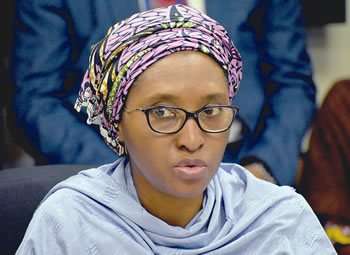[ad_1]
The Minister of Finance, Budget and National Planning, Dr Mrs Hajiya Zainab Shamsuna Ahmed has identified a lack of legal framework as one of the major factors affecting the efficacy of the country’s whistle-blower policy.
She, however, said that one of the responsibilities bestowed on Presidential Initiatives on Continous Audit (PICA), was the development and implementation of the Federal Government whistle-blower policy primarily to strengthen the fight against financial crimes and corruption by revealing information on financial crimes and rewarding whistleblowers across the country.
Ahmed stated this via virtual at a two-day zonal conference on whistle-blower policy in Nigeria for the South East Zone which took place at Prof. Dora Akunyili Women Development Center, Awka, Anambra State, on Thursday.
The programme according to the Minister, is to sensitize the Southeast zone on the whistle-blower policy which is a result of President Muhammadu Buhari administration’s to rigorously fight corruption in the country which is one of his campaign promises to Nigerians during the 2015 general election.
She noted that on the assumption of office, President Buhari set in motion, the machinery to strengthen the fight against corruption in Nigeria and in 2016, the Presidential Initiative on Continuous Audit (PICA) was established.
She added that the primary goal of the policy is to strengthen the fight against financial crimes and corruption by increasing exposure to financial crimes and rewarding whistle-blowers.
Declaring the event open, the Anambra State Governor, Chukwuma Soludo represented by the Head of Service, Mrs Theodora Okwy Igwegbe noted that in as much as the policy is to disclose information about wrongdoings, it should be centred on truth and fact.
“Sometimes, some people tend to report some issues even when they know it is a lie. As much as everybody is encouraged to say what they observe going on around them, it should be the truth.”
He then enjoined everyone to say something when they see wrong things happening around them.
Earlier in his welcome address the State Commissioner for Finance, Mr Ifeatu Onejeme welcomed everyone to the event, noting that whistleblowing has helped the country to recover loot carried away by some selfish individuals.
He noted that corruption has become a household name that is hitting the country badly and efforts to tackle it in the past did not work effectively; with the introduction of the whistle-blower policy, people are coming up to give vital information on corrupt practices.
“We believe that your coming to the South East, especially, in Anambra state, will leave us with new ideas on how to put the policy into practice for the good of our people,” he said.
The Commissioner was represented by the Permanent Secretary of the Ministry, Dr Emenike Ezenado.
In his paper presentation, the Executive Chairman of the Economic and Financial Crimes Commission (EFCC), Mr Abdulrasheed Bawa, who was represented by Mr Effiong Ekendo said that the whistle-blower policy was launched to encourage the citizenry to take ownership of the fight against corruption, rather than leaving it in the hands of the anti-graft agencies alone.
He noted that within a few months of its introduction, the Federal Government was able to recover huge sums of money, and it followed up on the avalanche of tips via sms, emails and phone calls from the members of the public, particularly to the Federal Ministry of Finance’s portal.
“Our sustained onslaught against internet fraudsters around the country has been most successful owing largely to verifiable intelligence the Commission received from concerned members of the public, often this leads to surveillance, arrest, investigation and eventual prosecution in courts,” he said.
Nigerian Tribune gathered that the event with the Theme: Implementation of the Whistle Blower Policy in Nigeria: Issues, Challenges and Way Forward” has in attendance, representatives from the various MDAs, Federal Road Safety Corps, Immigration, Nigeria Correctional Service, Civil Society Organisations(CSOs), NGOs and the media.
ALSO READ FROM NIGERIAN TRIBUNE
[ad_2]








